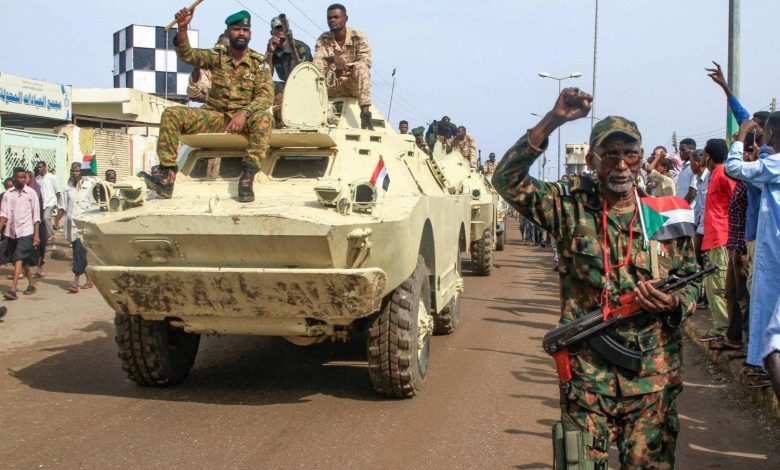Reports
Military Movements on the Frontlines… Rapid Collapse of the Militia

Sudan Events – Agencies
With the rapid advance of the Sudanese Armed Forces and the joint forces of armed resistance movements across various fronts, urgent questions arise about the reasons behind the rapid collapse of the Rapid Support Forces (RSF), and the motivations behind thousands of soldiers fleeing or surrendering without a fight, which has made the army’s mission easier. It is not an exaggeration to say that the Janjaweed militia has had significant support from the UAE, which has spent large amounts of money since the war began. This funding has equipped any militia to face major battles. So, what happened to them that led to their sudden collapse, which even surprised the Emiratis?
Sources of Weapons: The RSF uses a variety of weapons, including Russian and Chinese arms, as well as weapons confiscated from civilians. In 2017, 10,000 RSF soldiers were sent to Darfur to forcibly collect weapons, according to an open-source investigation by Bellingcat. Some sources indicate that weapons purchased by Saudi Arabia from Serbia likely ended up in the hands of the RSF due to their presence on the Saudi-Yemeni border. In the summer of 2018, videos posted on YouTube and Telegram showed Houthi forces displaying Serbian rifles produced by Zastava, taken from fighters’ bodies, along with Sudanese passports and ID cards from RSF members. Other weapons seized in the raid included light machine guns of the M84 type, produced by Zastava.
An article in the New York Times, shortly after the June 3, 2019 massacre when the RSF imposed a curfew in Sudan, claimed that Saudi Arabia and the UAE lavished money, weapons, and advice on Hemeti (RSF leader). The article also noted that UAE-made armored vehicles patrolled the streets of Khartoum, and that Saudi and UAE cargo planes landed at Khartoum airport just before the massacre, carrying military equipment, including surface-to-air missiles provided by the Russian Wagner Group mercenaries and armed drones.
Gold Exports: Reports indicate that much of the RSF’s modern weaponry comes from Libya, the main source of weapons for the Sahel region before and after the fall of former president Gaddafi. The European Union accused the RSF of using Sudan’s gold exports, through the “Al-Junaid” company owned by the Dagalo family, to secure military support from the UAE. The EU noted that much of Sudan’s gold production is smuggled to the UAE, where its proceeds are used to fund the RSF’s military efforts against Sudan.
The EU imposed sanctions on companies involved in purchasing military equipment for the RSF, including Al-Junaid Trading Company, Tradef General Trading, and GSK Advance Ltd. Al-Junaid is a Sudanese holding company controlled by Hemeti and his brother, who is also his deputy. The company, which is based in Khartoum, manages businesses in various sectors, including gold mining and trade. It holds mining concessions in Darfur, particularly in Jebel Amer (North Darfur) and the Sengou area (South Darfur), and the RSF has controlled these mines since 2017.
The EU highlighted that the gold mining and trade conducted through Al-Junaid is a major source of funding for the Dagalo family and the RSF, enabling them to continue the conflict in Sudan. The RSF also uses the proceeds from the gold exports to secure military support from the UAE and the Wagner Group, which helps provide the weapons they use in the conflict.
Why UAE’s Support? If we ask why the UAE is involved in Sudan alongside the RSF against the army, the Korean newspaper International explains that the reason behind the UAE’s intervention and its support for the RSF is to protect its investments in Sudan. For more than a decade, the UAE has invested in 50,000 hectares of agricultural land in Sudan, with future plans to invest in an additional 160,000 hectares to secure food and agricultural supplies for the UAE.
The infrastructure to link these agricultural lands to the Abu Imama port, built by the UAE, is supposed to be completed, with the UAE having already invested $6 billion in the project.
The agreement with the Sudanese authorities stipulated that Sudan would receive 35% of the income from the land’s production in exchange for the UAE having full control over the projects. However, the Sudanese army refused to give the guarantees requested by the UAE, considering that the agreement was unfair to Sudan and its people. This is where Abu Dhabi’s support for the RSF comes into play, according to International Korean.
Source: “Asda Sudanese” website.



